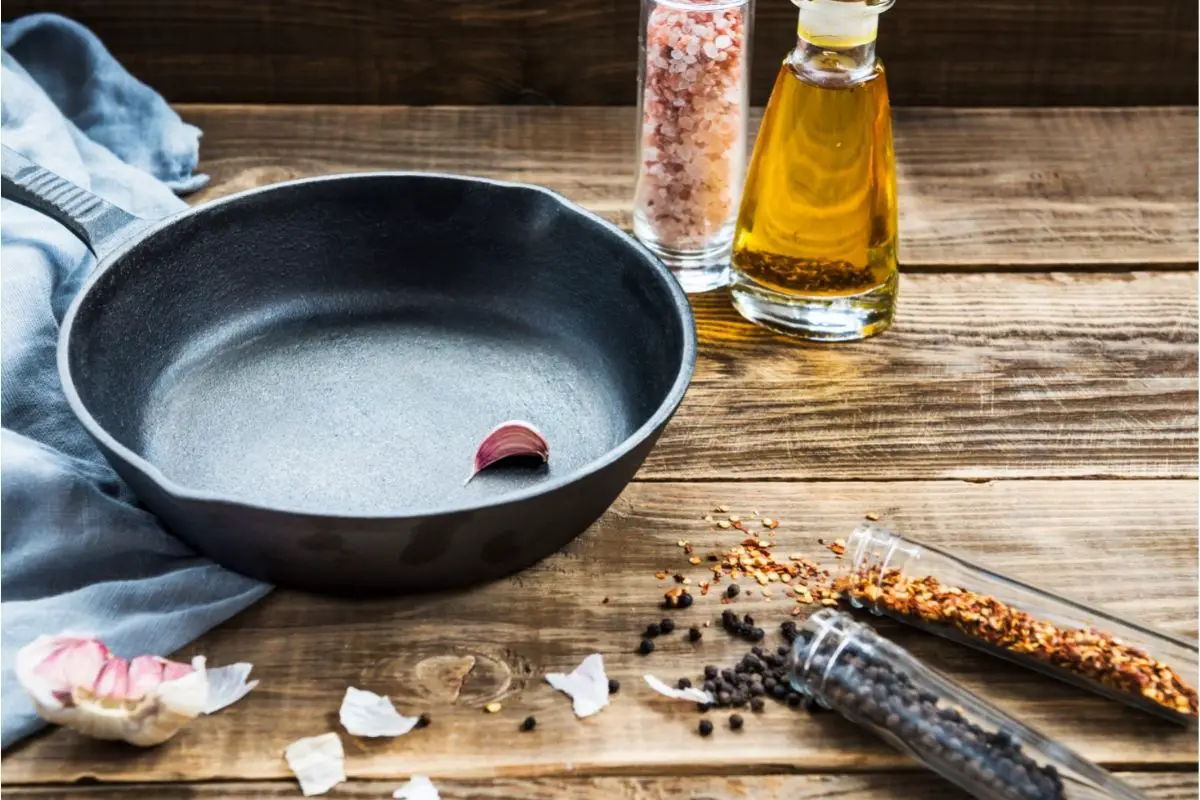So, you’ve just purchased a new cast iron pan. It’s beautiful, shiny, and new, and you can’t wait to get cooking with it. So what could possibly go wrong?
Table of Contents
ToggleWell, if you don’t use the right oil to season your cast iron, you risk damaging it fast.
Although some pans and skillets come pre-seasoned, if you’re not this lucky, you’ll need to source the right oil yourself and approach the seasoning process carefully.
However, if you’re not experienced with cast-iron, this might feel impossible to do.
Thankfully, you’ve come to the right place.
If you’re ready to learn more about seasoning cast iron and what oil you should use, stick with us to read through our round-up of the best seasoning oils and get ready to cook up a storm in the kitchen.
Best Oil For Seasoning Cast Iron
OUR TOP PICK

EDITORS CHOICE

BEST VALUE
No products found.Kuche Organic Cast Iron Flaxseed Oil
OUR TOP PICK
Pompeian Grapeseed Oil

Grapeseed oil is an excellent choice for seasoning cast iron, so let’s kick things off with this classic Pompeian Grapeseed Oil.
It has a nice light flavor and aroma that will bring out the best in your food.
Pompeian Grapeseed oil has been specially blended to help maintain its unique characteristics over time.
The grapeseed oil used in this blend was grown at Pompeii Farms in California, and it’s 100% organic, non-GMO, and free of any additives or preservatives.
This product is recommended by chefs and home cooks alike as one of the most versatile oils available.
It’s also perfect for cooking outdoors because it won’t smoke up your grill like other oils.
So when we used this oil to season our cast iron, it brought out the natural flavors of our steakhouse favorites.
This oil has a nice split between saturated and unsaturated fat, which makes it great for seasoning, and it’s easy on the wallet, too.
The average smoke point for this oil is around 420 Fahrenheit, making it a safe choice to season your cast iron with.
When we seasoned our cast iron with this grapeseed oil, we found that even just a thin layer of seasoning stood the test of time.
The seasoning held well, and we were able to use just this thin layer repeatedly over a week or two to cook a variety of foods, including those both low and high in fat.
Unfortunately, though, we did find it has a tendency to stain any fabrics lingering close by in your kitchen. So, be sure to move these out the way before you start seasoning.
Pros
- Non-toxic: Grapeseed oil is completely non-toxic, making it a safe choice to season your iron with.
- High Smoke Point: Grapeseed oil also has a high smoke point. Generally, oils with higher smoke points work best for seasoning your cast iron, which doesn’t tend to affect the flavor of your food.
Cons
- May Stain Some Fabrics: Be careful when seasoning, as grapeseed oil may stain some fabrics.
EDITORS CHOICE
La Tourangelle Canola Oil

Next up, we have La Tourangelle Canola Oil. Canola oil is highly recommended to season cast iron with.
It has a clean, neutral taste that brings out the natural flavors of whatever you’re cooking, and it’s great for cooking at high temperatures without smoking up your kitchen.
If you’re looking for good all-purpose canola oil, look no further than La Tourangelle.
They’ve got a wide range of products, from extra virgin olive oil to canola oil, and everything in between.
Their canola oil is especially ideal for seasoning cast iron because it has a medium smoke point (around 400 degrees) and a neutral flavor profile.
We recommend using this oil to season your cast iron after you first heat it up.
When we tested this oil, we heated our cast iron to 450 degrees, poured about 1/4 cup into each side of the pan, then waited 30 seconds before adding our favorite ingredients.
This worked SO well – you’ll be amazed how much better your food tastes!
Chefs and professional cooks across America recommend this oil. Chef Tom Colicchio uses this oil exclusively to season his cast iron pans.
Chef Michael Symon says he loves this oil so much that he buys it by the case.
And chef Chris Cosentino recommends it to anyone who wants to get the most out of their cast iron.
Our only complaint about this canola oil is its high price tag. So if you’re on a budget, this might not be the right one for you.
Pros
- Low Smoke Point: This oil has a relatively high smoke point, making it ideal for those who don’t want to risk burning their food. Since it’s also naturally anti-bacterial, it’s perfect for keeping your cast iron clean.
Cons
- Biting Texture: Some people find the texture of flaxseed oil to be too thick. Others enjoy the texture so much that they eat it straight from the bottle. You may have to adjust how often you use this oil based on your personal preference.
- Rancidity: As stated before, flaxseed oil goes bad really fast. Once you heat it up, it starts to break down and turn rancid. If you store it in the refrigerator, it will stay fresh longer. But, once you open the container, it will begin to spoil.
RUNNER UP
Betterbody Foods Refined Avocado Oil

Next on our list is the Betterbody Foods Refined Avocado Oil.
Avocado oil may not be the first oil that comes to mind when you think about seasoning your cast iron, but we’re here to tell you, it’s definitely one to consider.
Avocados are loaded with nutrients, especially monounsaturated fat, potassium, folate, fiber, and vitamins A and C.
They also contain lutein and zeaxanthin, two carotenoids that protect against macular degeneration.
Avocado oil will work wonders for your cast iron pan. It has a high smoke point of 570° which is ideal for seasoning.
If you want to guarantee a higher smoke point, always opt for a refined oil such as this one by Betterbody, as refined oils always have a higher smoke point.
When we tested this oil, we found it worked perfectly.
Its smoke point is so high and hard to reach (which we want), that the seasoning lasts much longer than oils with a lower smoke point.
Its neutral flavor profile also didn’t interfere with the taste of our food, so we could still enjoy all our favorite dishes without any weird aftertaste.
Our only complaint with this oil is the design of the bottle. This particular bottle is difficult to open, and it’s also quite small, so you won’t get a large amount of oil in the bottle.
Pros
- High Smoke Point: This oil reaches an extremely high smoke point, making it great for seasoning your cast iron.
- Nutritious Ingredients: Avocado oil is packed with vitamins A and D, beta-carotene, and minerals like zinc and magnesium.
Cons
- Difficult To Open Bottle: This bottle is difficult to open because there isn’t a tab or anything to help you pry it apart. It can take some time to get the cap off.
RUNNER UP
Spectrum Naturals Organic Sunflower Oil

Last but not least, we have this Organic Sunflower Oil by Spectrums. Sunflower oil is a versatile choice to season your cast iron with, and this particular brand works very well.
Sunflower oil contains vitamin E, which helps prevent oxidation and keeps your iron safe from rust.
It also contains omega-three fatty acids, which are essential for brain development and healthy skin.
The best part? It smells amazing! We love the smell of sunflower oil, and it doesn’t overpower the other flavors in your dish.
We tried using this oil to season our cast iron, and it was perfect. It had an excellent smoke point of 400°, so it wasn’t burning our food at all.
It also didn’t leave behind a strange flavor, so we were able to use it in everything from salads to stir-fries.
The only thing we don’t like about this oil is the bottle. It’s pretty big, and it doesn’t fit into most cupboards.
However, if you do have enough space, this is a great option for seasoning your cast iron!
Pros
- Smoke Point Of 400°F: This oil has a smoke point of 400°F, so it’s perfect for seasoning your cast iron pans.
- Flavorful And Nutritious: Sunflower oil is packed full of nutrition, including vitamin E, which helps keep your iron safe from rust, and Omega 3 Fatty Acids, which are essential for healthy brain development and healthy skin.
Cons
- Big Bottle: This oil comes in a really big bottle, and it takes up a lot of room on your shelf.
Best Oil for Seasoning Cast Iron Buying Guide
So, you’re considering buying a cast iron pan. If you’re a keen cook, we have no doubt whatsoever that you’ll LOVE cooking with cast iron.
You need to remember that caring for your cast iron is of the utmost importance.
Choosing the right oil for your cast iron is the most crucial decision you’ll ever make.
If you’re not sure where to start, take a look through our buyer’s guide to learn the things you should be looking for in your cast iron oil.
Then, we’ll look at some of the oils in our round-up and the benefits of some other alternatives for you to consider.

Flaxseed Oil For Cast Iron
Cast iron is one of the most complex materials to work with, as it requires constant maintenance.
Flaxseed oil is a popular choice among cast iron enthusiasts, as it works wonders to protect your cast iron from rust and maintain its shine.
This oil is made from flaxseeds, which contain high amounts of lignans, antioxidants, and fiber.
It can be used to season your cast iron or even apply directly to your cast iron after cleaning it.
It’s also an excellent moisturizer for your cast iron, which makes it ideal for those who want to avoid greasy foods.
Coconut Oil For Cast Iron
Coconut oil is another popular choice among cast iron lovers. Coconut oil is rich in medium-chain triglycerides (MCT), which help boost metabolism and burn fat more efficiently.
It can be used to season cast iron, and it will actually strengthen the surface of your cast iron over time. It’s a fantastic alternative to olive oil, as coconut oil is much easier to digest than olive oil.
If you live in a warm climate, coconut oil is a must-have for your kitchen. It keeps your cast iron from overheating and gives you a long-lasting non-stick coat — yippee!
Russian Orange Oil For Cast Iron
Russian orange oil is a popular choice amongst cast iron fans. Russian orange oil contains citric acid, which helps to clean your cast iron.
It also has antibacterial properties, making it a great choice for keeping your cast iron sanitary.
Russian orange oil is a very versatile oil, and it can be used to season both seasoned and unseasoned cast irons.
It’s perfect for seasoning cast iron skillets because it won’t leave behind any sticky residue.
Olive oil is a common option when choosing cast iron oil, but if you prefer something lighter, then Russian orange oil is a great alternative.
Frequently Asked Questions
What Is The Best Oil For Cast-Iron Cooking?
The best oil for cast iron depends on what kind of food you like to cook. Some people swear by extra virgin olive oil, while others love using flaxseed oil.
Whatever your preference, we recommend trying out different types of oil until you find the one that suits you best.
How Many Times Should I Season My Cast-Iron Skillet?
You should season your cast iron every three months.
This way, the protective coating is always topped up before any foodstuffs or cleaning materials reach the reactive metal beneath.
However, some particularly vigilant cooks will season their cast iron after every single use.
Do I Need To Wash My Cast Iron Before Seasoning It?
Yes! You should always wash your cast iron before seasoning it. Otherwise, you may end up with a splotchy mess.
Can I Use Aluminum Foil Pans for Frying?
Yes, you can use aluminum foil pans for frying. Frying with aluminum foil pans is a convenient option as they are affordable and disposable. These pans distribute heat evenly, ensuring that your food cooks uniformly. However, make sure to use a sturdy pan and monitor the heat to prevent any mishaps while cooking.
Final Thoughts
When choosing your cast iron oil, there are many factors to consider. The first thing to do is decide whether you want to use it to season your cast iron or just keep it shiny.
Then choose between different oils, such as flaxseed oil, coconut oil, and Russian orange oil.
Finally, think about how often you plan on using your cast iron and what kind of food you plan on preparing.
You might find that you don’t like the way your cast iron looks after being seasoned, so you may need to experiment with different oils until you find the perfect combination.








